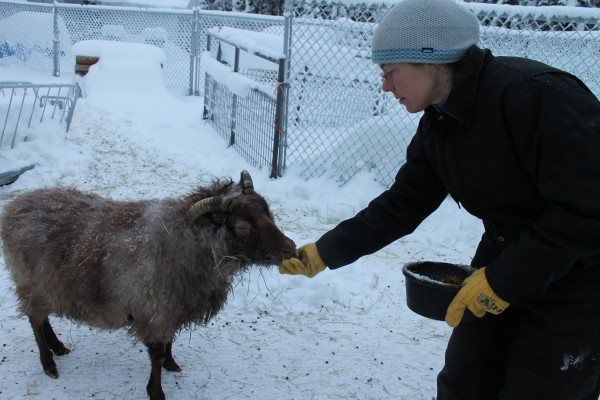Fyndinn Farm finds perfect animal for Fairbanks
January 28, 2014

Nancy Tarnai
907-474-5042
1/24/14
At Fyndinn Farm in the Goldstream Valley, Tamara Rose and Julie Guth-Schwab are raising the perfect animal for Alaska: Icelandic sheep.
“This is a really good environmentfor them,” Rose said. “They are really hardy.”
A financial bonus is the sheep don’t require grain and are able to thrive on hay and minerals. “That’s a huge deal,” Rose said. Plus, the animals are a multi-use species. “They are not great at one thing but are good at a lot of things,” she said. The meat is exceptionally mild, the fiber is useful for spinning and knitting and the milk makes good cheese.
Fyndinn is the Icelandic word for "funny," and Rose said it’s the right name for the “funny little farm.”
“We are small by choice for now,” Rose said. “I’m investigating markets and business approaches and working to improve the herd genetics. It’s a long process.”
Along with the sheep, Fynndinn has goats, rabbits, chickens and sled dogs. Rose has raced in the Yukon Quest and the Iditarod but now just mushes recreationally.
Rose grew up on the West Coast, spending summers at her grandparents’ farm in Washington. “I always wanted a farm but I didn’t know how to buy one, so I went to vet school,” she said.
She earned a degree in veterinary medicine at the University of California Davis. Because California was such an expensive place to live, Rose and Guth-Schwab investigated new locations. Fairbanks, with its dog mushing and room for a new bakery, was selected in 2004. The couple owns Lulu’s Bread and Bagels, and Rose has a mobile veterinary service that she runs from the back of her Honda Element.
About coming to Fairbanks, Rose said, “Part of it was the dogs and the need for a bakery. It’s an outdoorsy place; it’s more affordable and there are fewer people. We fit in pretty well here.”
While her dream was to have a goat farm, she found that financially prohibitive. After discovering Icelandic sheep, Rose decided to focus on them. She compared the ancient breed to shorthorn cattle. “They’re easy keepers,” she said. Last summer, she traveled to Vermont to buy a ram and a ewe, cargoing them back in dog crates. “It’s an adventure to fly with livestock.”
Currently, she has five ewes and two rams. Rose hopes to get started with artificial insemination soon, importing semen from Iceland. “I’m still learning. I wanted to spin and knit, but I don’t have the time.” Rose plans to sell the fleece as raw fiber and have some spun into yarn.
The challenge for her is marketing. “That’s a whole 'nother problem,” she said. “Especially meat, because it’s difficult to sell legally. Down south, you would sell to a middle man who would sell to grocery stores.” Many people request pork, and she doesn’t raise hogs.
Rose has to sell the live animal, and it’s up to the buyer to take care of slaughtering and butchering.
“It’s really rewarding providing food to people who appreciate it,” Rose said.
Her goals are to establish a flock of sheep with excellent genetics and to develop pasture and fences.
“It’s the same amount of work to do small or medium,” she said. “I want to see what people want and learn how to make it pay off.”
She doesn’t ever buy meat because of the goats, sheep and rabbits. In the summer, the garden at Fyndinn produces collards, mustard greens, spinach and chard.
Her advice to would-be farmers: “If you want to make money, know the business end of this. Not that I’m doing a good job of it, but you should have a business plan and do your research. And take good care of the animals, because people will know. If you do a good job, it will pay off in the end.”
CONTACT: fyndinnfarm@gmail.com or 907-388-3467,
This column is provided as a service by the –‘”˚…Á School of Natural Resources and Agricultural Sciences and the Agricultural and Forestry Experiment Station. Nancy Tarnai is the school and station‚Äôs public information officer. She can be reached at ntarnai@alaska.edu


